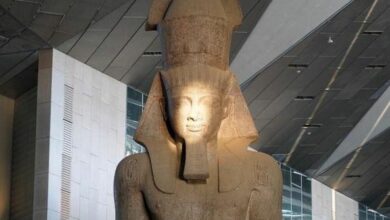For a journalist in Egypt, the Swiss public’s approval on Sunday of a ban on the construction of Islamic minarets should have been this month’s big scoop. After all, there were few domestic developments to write about owing to the recently-concluded Eid el-Adha holidays and the over-coverage of the ongoing Egypt-Algeria football controversy.
The Swiss referendum, meanwhile, has — from a journalist’s perspective — all the right ingredients for a bombshell story: religion, politics and a seeming reaffirmation of the alleged Western plot against Islamic identity. Surprisingly, though, the referendum has not received the interest garnered by similar incidents in recent history, such as the 2005 publication of caricatures of Prophet Mohammed in a Danish newspaper or the murder of a veiled Egyptian woman in a German courtroom four years later.
There have been no calls to boycott Swiss products or stage demonstrations to protest the alpine country’s decision — even though the move reflects popular mobilization against one of Islam’s most conspicuous symbols.
The modest reactions might be explained by the socio-political context. Columnist Hany Salaheddin of independent weekly Al-Youm Al-Sabea saw the ban as yet another example of hypocrisy by the "democratic" West.
“Democracy and freedom of worship and beliefs are only mantras used by the West in recent decades to blackmail and pressure Arab and Muslim countries,” Salaheddin opined. The Swiss vote, he wrote, represents “an extension of the American legacy of hatred and readiness to besiege whatever is seen as ‘Islamic’ — all in the name of combating terrorism and extremism.”
Salaheddin’s view, however, was not picked up in most of the mainstream media. Unlike with previous controversies, Egyptian officialdom has abstained from commenting on the ban, leaving only a handful of state-appointed imams to do the job. At the end of the day, talk about the "democratization" and "reformation" of the Arab Middle East clearly belongs to the past, with the focus now shifting to the rise of right-wing European political parties and their inclination towards “Islamophobia.”
Flagship government daily Al-Ahram covered the criticisms of the Swiss decision by leading European officials such as French Foreign Minister Bernard Kouchner, who saw the development as "a reflection of religious intolerance.”
Other local newspapers followed suit. Official daily Ros el-Yusuf dedicated an entire page to discussing the surge of radical right-wing politics in countries with large Muslim minorities, such as Holland and Germany.
Columnist Hamed Abdel Samad of Al-Youm Al-Sabea argues that the ban “reflects Europe’s search for a new identity, with Islam becoming the common enemy to unify the continent after the collapse of the Soviet Union.” Abdel Samad placed the Swiss decision within the context of the recent global economic crisis, which has resulted in massive unemployment and which is, in turn, inevitably accompanied by rising xenophobia.
Fears of a possible comparison to conditions faced by religious minorities in Egypt might also explain the seeming lack of interest in the issue. “We mustn’t be tricked into discussing Egypt’s domestic affairs when debating the Swiss decision,” warned chief editor of Ros el-Yusuf Abdalallah Kamal.
Egyptian Christians, for example, who account for roughly 10 percent of the population, have consistently complained about legal restrictions imposed on the construction of churches in Egypt. Columnist Karim Abdel Salam of Al-Youm Al-Sabea argues that some Islamic countries — including Egypt — enforce “similar unjust and racist practices” on their religious minorities.
“If we’re troubled by the Swiss motion, how then can we justify restrictions imposed on building churches in the Arab World?” asked Abdel Salam. “Could we ever imagine approval being granted for the construction of a Buddhist temple [in Egypt], for example?”
Leaving Swiss Muslims to handle their own affairs was another position put forward by some Egyptian newspapers. On its front page, independent daily Al-Shorouk pointed to calls by Adel Al-Magari, head of the Muslim Swiss League, for other Muslim countries “not to interfere in our internal situation.”
“We will resort to legal and civic means to resist the results of the referendum,” Magari told Al-Shorouk, adding that Swiss Muslims were opposed to other countries “involving themselves in our issues.”
The surprisingly light coverage of the Swiss vote might also be attributed to the symbolic nature of Islamic minarets. Unlike the face veil worn by many Muslim women, minarets have been traditionally seen as little more than decoration, or as an architectural device from which calls to prayer can be heard from a distance.
One writer for Ros el-Yusuf, for example, noted that Salafi groups in Egypt considered the minaret a "Bid‘ah," a religious innovation not originally revealed in the Quran or in the sayings and deeds of the prophet.




